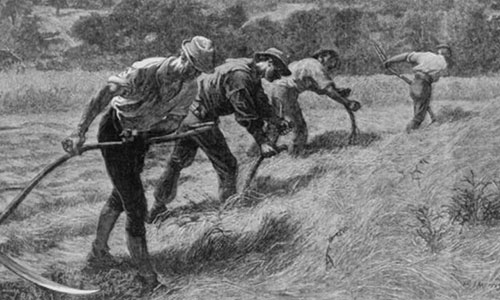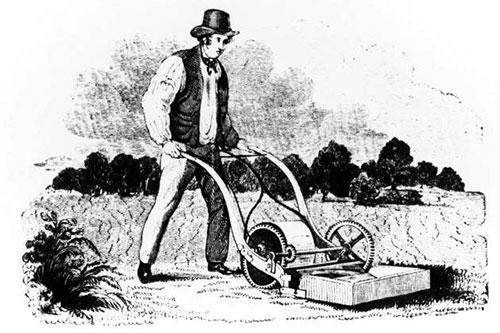Get Off My Lawn
Lawn mowers are a relatively new phenomenon that made grass-cutting something the average person could do. Before that, it was a game for the elites.

Before lawn mowers, you either needed cows or an army of servants
For generations, we've heard chatter that machines were eventually going to take over our jobs and make us all broke, poor, and useless, with no reason to work.
But the lawn mower is a reminder of what can happen when a machine democratizes something that was once only available to society's elite. Within the span of a couple of generations, fancy lawns went from something only rich people could afford to a standard of suburban life. And the reason for that is the lawn mower.
Lawns with short grass have only been in style for the past few hundred years or so—thanks to members of the French royalty like Louis XIV, who helped sell the rest of the world on the idea. Problem was, tapis vert, or perfectly short grass, was difficult to achieve at first, which meant it was cost-prohibitive for most people.
Prior to the lawn mower, you needed lots of physical manpower to keep up the fancy look of a well-kept garden, which meant you needed a lot of servants to keep up the look of things. Those who worked on lawns needed tools such as shears and scythes to keep the turf at a reasonable length. (Then again, you could always have farm animals foraging on the property, but they also tend to … uh, well … self-fertilize.)

Meet the guy who saved the middle class from back-breaking work
If Victorian lawn care sounds like more trouble than it's worth, you can thank Edwin Beard Budding for saving the day. In 1827, the British engineer came up with the wheel-and-blade machinery behind the modern lawn mower. Budding's mower, which was invented decades before the gas-powered engines we're familiar with today, relied on a horizontal cylinder shape, and he kept improving it.
At first, you could only cut grass by pushing it forward; later, he came up with different sizes, eventually allowing for grass to be cut no matter which way you push the device.
Budding died before his device went mainstream, but eventually it did, thanks to two key factors: the rise of the suburb, which meant more people had grass to maintain, and the internal combustion engine, which put a little power in those blades and made the job of lawn maintenance even easier.
"It's amazing that his invention is pretty much unchanged, nobody's found a better way of doing this than he found in 1830," David Withers, the president of mower-maker Ransomes Jacobsen, said upon putting a plaque on Budding's original workshop back in April.
Soon enough, we'll probably be all able to maintain our lawns with robots—well, as long as they don't piss off astronomers in the process.
49
Watch this guy out-mow a lawn mower with just a scythe and a dream
The grim reaper has nothing on Simon Danant. In the grand tradition of people being better at things that they don't really need to be all that good at, Danant has become a legend in scythe-cutting circles for his ability to cut massive fields of grass with nothing more than a giant blade that most people associate with Adam Carolla guest appearances on Family Guy.
Danant, a forester and an expert at living off the grid, is one of the greatest living scythe-cutters. In various online videos, the shirtless Danant has managed to destroy competitors in lawn-cutting competitions. Weed whacker? Didn't even compare. Lawn mower? Close, but he still won.
If you want to cut things down like Simon does, check out the Scythe Association of Britain & Ireland, which helps put on scything festivals every year. One such festival that took place over the weekend, the Green Scythe Fair, drew as many as 4,000 people—some of whom came from as far away as Australia to attend.
Admit it, your Toro sucks in comparison, right?
$15k
But perhaps, like the residents of Rancho Santa Fe, we care too much about these plots of grass that cover our land and force us into a never-ending cycle of maintenance, all for the benefit of some extra property value.
Author Michael Pollan, perhaps one of the country's most famous food and plant advocates, once wrote an essay describing how he grew philosophically opposed to lawn care, and you sort of feel for the blades of grass by the end of the piece.
"Mowing the lawn, I felt like I was battling the earth rather than working it; each week it sent forth a green army and each week I beat it back with my infernal machine," he wrote back in 1989. "Unlike every other plant in my garden, the grasses were anonymous, massified, deprived of any change or development whatsoever, not to mention any semblance of self-determination. I ruled a totalitarian landscape."
Pollan, who turned his lawn into a garden, has a point. In a world where complexity and diversity of plant life is often treasured, why are we so obsessed with the clean perfection of a yard where every blade is in its correct place? Maybe live and let live?
Perhaps Mother Nature is trying—with her dry, parched, overbearing sense of humor—to give a hint to the folks of Rancho Santa Fe: If you're so obsessed with green carpet, buy astroturf.
:format(jpeg)/2018/04/ew0dv74xf5hvkidnbxqm--1-.gif)
/2018/04/ew0dv74xf5hvkidnbxqm--1-.gif)

/uploads/ernie_crop.jpg)